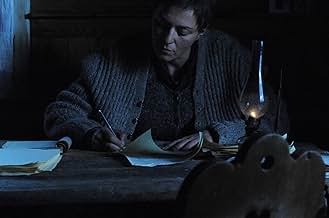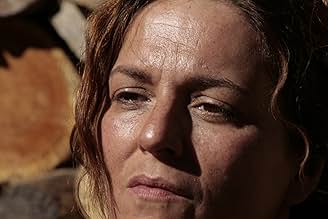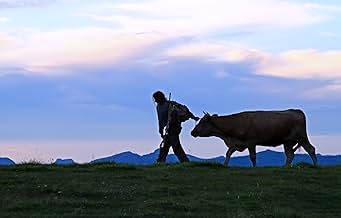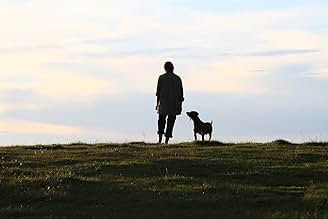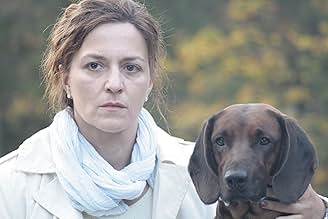Una mujer se encuentra inexplicablemente aislada de todo contacto humano cuando un muro invisible e inflexible rodea de repente el paisaje.Una mujer se encuentra inexplicablemente aislada de todo contacto humano cuando un muro invisible e inflexible rodea de repente el paisaje.Una mujer se encuentra inexplicablemente aislada de todo contacto humano cuando un muro invisible e inflexible rodea de repente el paisaje.
- Dirección
- Guionistas
- Elenco
- Premios
- 5 premios ganados y 15 nominaciones en total
Karlheinz Hackl
- Hugo
- (as Karl Heinz Hackl)
Wolfgang M. Bauer
- Man
- (as Wolfgang Maria Bauer)
- Dirección
- Guionistas
- Todo el elenco y el equipo
- Producción, taquilla y más en IMDbPro
Opiniones destacadas
While browsing on IMDb for interesting scifi flicks to watch I stumbled upon this Austrian science fiction film. A scifi concept movie I should say: there are no lasers or spaceships or any other hi-tech stuff to be seen. A woman (her name is never mentioned) goes on weekend in a mountain cabin with and elderly couple. The couple leaves to take a walk but never returns. Reason: the Wall or 'Die Wand', an energy forcefield which keeps everything from going out or coming in. This leaves this woman completely cut off from civilization, society and basically everything she knows and loved. Obviously this is what this film is about. It's not about explaining why this wall is there or who built it or for what reason. It's about the mental, emotional and ethical problems that arise when there is no more society to live, work and function in. This film was apparently based on a successful 1963 Austrian novel. The whole film is told via the voice-over of the woman (she never has any direct dialogue) and all the acting is delivered through expressions or actions. This was smart on the part of the filmmakers coz it works well and it feels a lot like a book. Although the film lasts only 103 mins it does have a slow pace, but like a book you have to take time to see it at the pace it's intended to. Recommended!
Hard to write this without spoilers, but here goes...
The Wall is not sci-fi, and it's not what a lot of other reviewers seem to think either. It's not a bad film at all.
Deliberately set in a beautiful but challenging place - the place the central character inhabits, The Wall could be about any boundary between ourselves and the outside world. It's very solitary, very existential, very personal. I rather liked this: an inner journey.
Superbly photographed, The Wall is worth watching just for this.
Speaking personally, to me it's obvious what the sub-text is. I won't name it, but the symbolism is clear: a white crow, two animals giving birth, a single mature woman alone, a companion who can be no more than that. There are other more subtle symbols too.
At root, The Wall is an exploration of extreme isolation, and a realisation of what that really means.
The Wall is not sci-fi, and it's not what a lot of other reviewers seem to think either. It's not a bad film at all.
Deliberately set in a beautiful but challenging place - the place the central character inhabits, The Wall could be about any boundary between ourselves and the outside world. It's very solitary, very existential, very personal. I rather liked this: an inner journey.
Superbly photographed, The Wall is worth watching just for this.
Speaking personally, to me it's obvious what the sub-text is. I won't name it, but the symbolism is clear: a white crow, two animals giving birth, a single mature woman alone, a companion who can be no more than that. There are other more subtle symbols too.
At root, The Wall is an exploration of extreme isolation, and a realisation of what that really means.
It's complete art-house fare but since the source material is one of Austria's great novels of the 20th century (it was written in the early 1960s) they gave this film a semi-wide release here in Austria. It's a last-woman-on-Earth-story - think about Robinson Crusoe, The Road, I am Legend, but very naturalistic except for the wall which traps the protagonist in a secluded alpine area. It was a bit toned down from the book - some of the more violent or disgusting passages were missing, I guess not to alienate the audience too much since the story is intense enough already. This seemed to work as WOM is quite good, everybody was discussing it on our way out. My son (who didn't know the book) was impressed too. Also left out were any references to the cold war which were not that important in the book to begin with; here the wall is more like a natural catastrophe and the story is much more timeless this way. From a technical POV this was excellent, filmed with a RED-to-35mm and much natural light I think. Most of the crew hail from TV productions but it's clearly visible how much fun they had with the wide format. Sound design was good too. Music was sparse, a few Bach sonatas. And I liked how they didn't color-grade the thing to death as happens sometimes (The Road, Children of Men ...) - the story is bleak enough without much fiddling - we get the message. The landscape, wood and winter sequences are just beautiful. Highly recommended if you're able to see this. Maybe it gets a foreign run; there's nearly no dialogue, most spoken text is just off-screen-quoting from her diary so subtitles or dubbing won't really take away much.
Confusing, narrated, strange, and difficult to follow. Too many questions regarding the actions of the main character. I don't know about you, but I'd have done so many other, different, and direct things than this main character in order to extract myself from my current situation. The wall: did the river run through it? Was it like a dome? Was it bulletproof? Would it be possible to dig beneath it? Were animals affected by it? Maybe I should just write a story about it... no, that would be boring. In order to change or alter my situation, I would have to do something different each day. The lead and only character was satisfied with her predicament. I do wonder, however, about the end result.
What a beautiful story this is. I can understand why Julian Pölsler wanted to film his favorite book of Marlen Haushofer, a book that I've now added to my to read list.
The scenery of Austria is so beautiful. Experiencing the country through all the seasons would have been enough for me to watch the movie. But the movie is so much more than just beautiful scenery. The plot made me profoundly think about humanity, nature, life... and if a movie succeeds in doing that it deserves merit. I also like that multiple interpretations can apply to the movie, since it has a certain symbolical feel to it, rather than being a science fiction or utopian/dystopian story. I for example see a lot of parallels with someone who has a depression, not being able to fight an invisible wall, struggling to do everyday tasks in order to survive, feeling alienated.
It's great how the connectedness with nature is illustrated. How we depend on nature and how nature depends on us. How we humans are gods who are able to choose to kill or let live, who can choose to kill the very nature that makes us survive.
Perhaps for people who have read the book, the movie doesn't add more than beautiful scenery and a good acting performance by Martina Gedeck and not to forget dog Luchs, but for me it's definitely worth the 8*.
The scenery of Austria is so beautiful. Experiencing the country through all the seasons would have been enough for me to watch the movie. But the movie is so much more than just beautiful scenery. The plot made me profoundly think about humanity, nature, life... and if a movie succeeds in doing that it deserves merit. I also like that multiple interpretations can apply to the movie, since it has a certain symbolical feel to it, rather than being a science fiction or utopian/dystopian story. I for example see a lot of parallels with someone who has a depression, not being able to fight an invisible wall, struggling to do everyday tasks in order to survive, feeling alienated.
It's great how the connectedness with nature is illustrated. How we depend on nature and how nature depends on us. How we humans are gods who are able to choose to kill or let live, who can choose to kill the very nature that makes us survive.
Perhaps for people who have read the book, the movie doesn't add more than beautiful scenery and a good acting performance by Martina Gedeck and not to forget dog Luchs, but for me it's definitely worth the 8*.
¿Sabías que…?
- TriviaOfficial submission of Austria to the Oscars 2014 best foreign language film category.
- ErroresWhen she goes to bed for the first night, it's dark outside. Later she explains she went to bed at 9pm on this May day. It's nowhere near dark at 9pm in that region, especially with DST.
- Citas
Woman: Now I am completely calm. I see a little bit further. I see this is not the end yet. Everything goes on. Taurus, Pearl and Luchs will not return. But something new is approaching, and I cannot escape it. The memory, the grief and the fear will remain and there will be hard work as long as I live.
- ConexionesFeatured in Starfilm (2017)
Selecciones populares
Inicia sesión para calificar y agrega a la lista de videos para obtener recomendaciones personalizadas
- How long is The Wall?Con tecnología de Alexa
Detalles
- Fecha de lanzamiento
- Países de origen
- Sitios oficiales
- Idioma
- También se conoce como
- Die Wand
- Locaciones de filmación
- Productoras
- Ver más créditos de la compañía en IMDbPro
Taquilla
- Total en EE. UU. y Canadá
- USD 38,674
- Fin de semana de estreno en EE. UU. y Canadá
- USD 2,188
- 2 jun 2013
- Total a nivel mundial
- USD 3,889,260
- Tiempo de ejecución
- 1h 48min(108 min)
- Color
- Mezcla de sonido
- Relación de aspecto
- 2.35 : 1
Contribuir a esta página
Sugiere una edición o agrega el contenido que falta


